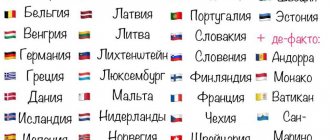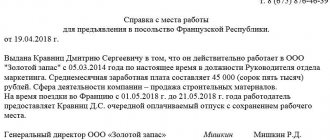Legal framework for solving social problems of refugees
The problems of migration in modern society are universal.
Today, a legal framework for the social problems of refugees has been formed and is functioning, including both state and international legislation. The legislative framework of the Russian Federation on refugee issues consists of: the laws “On Forced Migrants”, “On Refugees”, “On Citizenship of the Russian Federation” and the federal migration program. All these legislative acts are aimed at regulating the stay of migrants in the country and protecting their rights.
Social protection of refugees is also regulated by the main acts of international law, which include: the UN Convention relating to the Status of Refugees, the Final Act of the Conference on European Security and Cooperation, signed in Helsinki.
Finished works on a similar topic
- Course work Social work with refugees 400 rub.
- Abstract Social work with refugees 250 rub.
- Test work Social work with refugees 240 rub.
Receive completed work or specialist advice on your educational project Find out the cost
Features of refugee status in the Russian Federation
Confirmation of the official assignment of refugee status is the handover, which gives the right to stay in the Russian Federation and appear on this territory. Information about minor children is included in the refugee certificate of one of their parents. When leaving the territory of Russia, refugees are issued a special travel document.
One of the main advantages of refugee status is that it is granted indefinitely, but it can be lost. By paragraph 2 of Article 8 of February 19, 1993 No. 4528-1, a person recognized as a refugee on the territory of the Russian Federation and members of his family who arrived with him are obliged to undergo re-registration at least once every year and a half.
Read more about the rights of refugees in the Russian Federation and what privileges it provides.
Main directions and principles of social work with refugees
Definition 1
Refugees are migrants forced to leave their country due to fear of persecution for political, religious, racial or other reasons.
Forced migrants, or displaced persons, are migrants forced to move within the country due to fear of persecution for political, religious, racial and other reasons.
Note 1
Refugees and internally displaced persons belong to the most complex category of migrants in terms of various associated problems. These persons are especially in need of social assistance from the state in which they find themselves.
Social work with refugees covers three areas:
- Social therapy at the family and personal levels, the goal of which is to provide conditions for more complete and successful adaptation, rehabilitation and resolution of conflict situations.
- Social work with various groups - youth, children, the elderly, groups based on gender, similar problems, interests, etc.
- Social work in the community. Aimed at strengthening community ties, creating a favorable psychological climate in the places where migrants live, and expanding the network of social services.
Are you an expert in this subject area? We invite you to become the author of the Directory Working Conditions
Social work with refugees is an activity aimed at providing emergency assistance to migrants.
Migration policy is the main way to regulate migration flows and solve social problems of migrants, which is a set of socio-political concepts relating to the migration situation in the country and aimed at creating conditions for social adaptation and accommodation of migrants.
Main directions of migration policy: accounting and analysis of the migration situation in the country; providing practical social assistance to refugees; reorganization of the social environment for the effective adaptation of refugees to new conditions.
Note 2
When organizing social work with refugees, it is necessary to take into account that refugees unwittingly find themselves in a situation of marginalization (there is no usual social environment for living, natural and anthropological rights are destroyed, namely, the right to ethnic identification, family, housing, a certain standard of living. Social work should be built on the basis from the fact that refugees are persons in a state of social, cultural and psychological maladjustment.
An effective solution to the social problems of refugees without harm to the host party is possible by observing the basic principles of social work with this category of people:
- It must be remembered that most refugees will stay in the country for quite a long time or will remain forever, i.e. Migrants can make a significant contribution to the further development of the country.
- Government bodies at different levels of its organization are the main subjects of activity in solving social issues of refugees.
- It is important to encourage migrants to develop a sense of belonging to a new state, society and culture.
- A necessary and important condition for effective social support for refugees is the achievement and subsequent maintenance of equality between the local population and migrants.
- Integration of migrants into a new society, harmonization of social relations and connections between them and the local population is a long-term process.
Compliance with these principles will help to effectively and timely resolve the social problems of refugees, using the opportunities and potential that the state and society have at their disposal.
Areas of social work with refugees
Social work with refugees and internally displaced persons is carried out in the following areas:
- Professional and labor adaptation. Full use of the professional and labor potential of migrants in new conditions and at a new place of residence, including: employment of refugees, taking into account the needs of the market and the qualifications available to migrants; creation of new jobs; organization of professional retraining and training for migrants; development of the self-employment system.
- Problems of material compensation for damage. Providing refugees with the necessary medical care, housing, paying benefits established by law, establishing the extent of damage suffered by migrants, creating conditions for social, labor and socio-psychological rehabilitation and adaptation.
- Formation of a favorable system of relations between refugees and the local population.
- Development of a system of legal protection for refugees, preventing any form of discrimination against them. To resolve issues in this area, information, educational, sociocultural institutions, etc. must be connected to legal institutions.
- Psychological rehabilitation and adaptation of refugees. This direction is implemented with the help of psychologists, psychiatrists, psychotherapists, whose work is aimed at overcoming the psychological consequences of the reasons for moving, negative mental manifestations, creating opportunities and conditions for subsequent full and active life in a new place.
- Formation of conditions for the successful integration of refugees into a new society. It is implemented through taking measures to achieve true social equality between the local population and migrants, providing assistance for the inclusion of refugees in a new cultural and social environment (development of a social protection system, educational services, support for the culture and language of migrants), and the formation of a system of intercultural communications.
The practical implementation of these areas of social work by migration services employees and social workers should be carried out taking into account the ethnic, demographic, sociocultural and other characteristics of refugees.
— — Do you need help creating a study plan? — Specify a topic and receive a response in 15 minutes — — — — — — get help — —
Technologies of social work with refugees and internally displaced persons.
According to the UN definition, migration is the movement of persons for a period of more than 6 months. This is not just the mechanical movement of people, but a complex process that affects many aspects of social life.
A migrant is a person who carries out spatial movements, regardless of the reasons for the movements, their duration and spatial boundaries.
In February 1993 The Federal Law of the Russian Federation “On Refugees” on February 19, 1993 No. 4528-1 and “On Forced Migrants” on February 19, 1993 No. 4530-1 were adopted. Simultaneously with the adoption of the laws, the Federal Migration Service was created.
A refugee is a person who is not a citizen of the Russian Federation and who, due to well-founded fears, has become a victim of persecution on the grounds of race, religion, citizenship, nationality, membership of a particular social group or political opinion, is outside the country of his citizenship and cannot enjoy protection of that country or is unwilling to avail itself of such protection owing to such fears; or, being of no nationality and being outside the country of his former habitual residence as a result of such events, is unable or unwilling to return to it owing to such fear.
Most are forced, displaced and refugees
- these are persons who have suffered from the deterioration of interethnic, interethnic. relationships, due to hostilities, fleeing natural disasters, social factors. risk; a significant part of them are fully able to work, have an appropriate level of education and have a defined labor qualification, looking for a worthy use of their strengths and abilities, striving for a better life.
Providing forced migrant status, their registration, assistance in settling
, as well as coordination of the actions of federal executive authorities of constituent entities of the Russian Federation and local self-government are carried out by federal and territorial bodies of the migration service.
In accordance with the Decree of the Government of the Russian Federation “On measures to provide assistance to refugees and internally displaced persons” (1992), providing. a number of measures to assist them: payment of benefits, assistance in finding employment, solving housing problems. As a result of government decisions, migrants receive certain assistance from the state.
(Order of the Committee of the Russian Federation on Land Resources and Land Management “On the provision of land plots to forcibly displaced citizens” dated March 24, 1995, No. 25; Decree of the Government of the Russian Federation “On the provision of long-term interest-free repayable loans to refugees and forced migrants” dated October 6, 1992, No. 762) .
Social institutions Public services take a significant part in the settlement and adaptation of refugees and forced migrants, first of all, by assisting them in receiving all types of benefits and benefits, and are engaged in the placement of children of refugees and forced migrants in educational institutions at their place of residence.
Social technology working with migrants will bring positive results if there is a clear and well-thought-out policy and program for predicting migration. processes and specific migrations. flows, regional migration programs to assist migrants and refugees in adapting to new places of settlement. Solving such problems is possible if the Federal Migration Department works together. services and authorities (federal and regional), allocation of quotas for migrants and certain territories for settlement. A significant part of refugees and migrants, independently or at the expense of raised funds, build villages with economic enterprises.
Practical social work with migrants is carried out in the following main areas: - social,
- socio-psychological,
- social and pedagogical,
- social and legal,
- socio-economic,
- social and labor,
- social and informational.
1. Social direction
includes: conducting social consultations; carrying out social rehabilitation activities; identification of persons especially in need of social assistance; social diagnostics; assistance to migrants in obtaining pensions and benefits; prevention of deviant behavior, homelessness; interaction with various government agencies and public organizations on issues of assistance to migrants.
2. Social and information direction
(carried out in contact with the State Statistics Committee of the Russian Federation and the media): informing migrants about the activities of social services; collection of information about migrants and its systematization; promoting adequate media coverage of the topic of migration.
3. Social-psychological direction
(in contact with education and health authorities): psychological counseling; psychological correction and assistance in social adaptation; psycho-prevention of stress, psychological diagnostics of the development of children from migrant families; psychological assistance in acute crisis situations.
4. Social and pedagogical direction
(with education, healthcare, law enforcement agencies): social and pedagogical work with children and adolescents; control over the education of children from migrant families; professional counseling and assistance in obtaining vocational education, prevention of deviant behavior.
5. Social and legal direction
(judicial and law enforcement agencies): protection of the rights of migrants; social and legal consultation.
6. Medical and social direction
: medical and social counseling; providing assistance in obtaining medical and drug assistance; socio-psychiatric diagnostics; referral to specialized medical facilities. institutions.
7. Financial direction
: providing start-up assistance (providing loans) based on the principle of an individual approach.
8. Socio-economic direction
: consultations on socio-economic issues; assistance in increasing income.
9. Material direction
: provision of food assistance, clothing and other in-kind assistance
10. Social and labor direction
: assistance in obtaining primary and additional work; consulting on labor, employment and career guidance issues.
There are also several public funds
: “Commonwealth”, “Russian Fund for Refugees”, “Compatriots”, etc. The assistance provided by these funds is addressed to refugee associations and communities. For example, the Compatriots Foundation was able to really help several tens of thousands of people: there are branches of the foundation in many cities of the Russian Federation. The Foundation not only finances, but also monitors the implementation of programs, for example, the program for community accommodation and integrated settlement of displaced persons.
Social technologies work with minorities (ethnic groups):
National minorities
- these are those national groups that live outside their national territory (Ukrainians, Belarusians, Germans, Kazakhs, Armenians...)
Constitution of the Russian Federation Art. 19 (clause 2) The state guarantees at the state level (federal). At the regional level, classes in schools are conducted in the languages of many national minorities, there are clubs, and television.
Local level: (depends on the attitude towards this category of people in a particular area)








